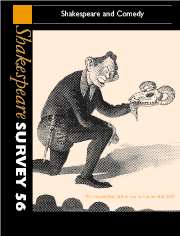Book contents
- Frontmatter
- Looking Like a Child – or – Titus: The Comedy
- Comedy and Epyllion in Post-Reformation England
- (Peter) Quince: Love Potions, Carpenter’s Coigns and Athenian Weddings
- ‘When Everything Seems Double’: Peter Quince, the other Playwright in A Midsummer Night's Dream
- Cultural Materialism and Intertextuality: The Limits of Queer Reading in A Midsummer Night's Dream and The Two Noble Kinsmen
- As You Liken It: Simile in the Wilderness
- Infinite Jest: The Comedy of Hamlet, Prince of Denmark
- Othello and the End of Comedy
- Shakespeare as a Joke: The English Comic Tradition, A Midsummer Night’s Dream and Amateur Performance
- Falstaff’s Belly, Bertie’s Kilt, Rosalind’s Legs: Shakespeare and the Victorian Prince
- The Sixth Act: Shakespeare after Joyce
- The Return of Prospero’s Wife: Mother Figures in The Tempest’s Afterlife
- Directing Shakespeare’s Comedies: In Conversation with Peter Holland
- ‘To Show our Simple Skill’: Scripts and Performances in Shakespearian Comedy
- John Shakespeare’s ‘Spiritual Testament’: A Reappraisal
- Shakespeare as a Force for Good
- Timon of Athens and Jacobean Politics
- Man, Woman and Beast in Timon’s Athens
- Rough Magic: Northern Broadsides at Work at Play
- Shakespeare Performances in England, 2002
- Professional Shakespeare Productions in the British Isles January–December 2001
- The Year's Contributions to Shakespearian Study 1 Critical Studies
- 2 Shakespeare’s Life, Times and Stage
- 3 Editions and Textual Studies
- Books Received
- Index
Looking Like a Child – or – Titus: The Comedy
Published online by Cambridge University Press: 28 March 2007
- Frontmatter
- Looking Like a Child – or – Titus: The Comedy
- Comedy and Epyllion in Post-Reformation England
- (Peter) Quince: Love Potions, Carpenter’s Coigns and Athenian Weddings
- ‘When Everything Seems Double’: Peter Quince, the other Playwright in A Midsummer Night's Dream
- Cultural Materialism and Intertextuality: The Limits of Queer Reading in A Midsummer Night's Dream and The Two Noble Kinsmen
- As You Liken It: Simile in the Wilderness
- Infinite Jest: The Comedy of Hamlet, Prince of Denmark
- Othello and the End of Comedy
- Shakespeare as a Joke: The English Comic Tradition, A Midsummer Night’s Dream and Amateur Performance
- Falstaff’s Belly, Bertie’s Kilt, Rosalind’s Legs: Shakespeare and the Victorian Prince
- The Sixth Act: Shakespeare after Joyce
- The Return of Prospero’s Wife: Mother Figures in The Tempest’s Afterlife
- Directing Shakespeare’s Comedies: In Conversation with Peter Holland
- ‘To Show our Simple Skill’: Scripts and Performances in Shakespearian Comedy
- John Shakespeare’s ‘Spiritual Testament’: A Reappraisal
- Shakespeare as a Force for Good
- Timon of Athens and Jacobean Politics
- Man, Woman and Beast in Timon’s Athens
- Rough Magic: Northern Broadsides at Work at Play
- Shakespeare Performances in England, 2002
- Professional Shakespeare Productions in the British Isles January–December 2001
- The Year's Contributions to Shakespearian Study 1 Critical Studies
- 2 Shakespeare’s Life, Times and Stage
- 3 Editions and Textual Studies
- Books Received
- Index
Summary
Twenty lines in to A Midsummer Night’s Dream, when ‘merriments’, ‘mirth’ and ‘pomp’ have been ordered up to close off and reconcile with sportive ‘triumph’ the memory of the ‘injuries’ inflicted in the pre-history of the play by ‘triumph’ of a martial kind, Egeus comes crashing in upon Theseus’s pre-marital tête-à-tête, fuming, spluttering, ‘Full of vexation . . . with complaint / Against my child, my daughter Hermia’ (1.1.22–3). Stubborn Hermia has dug her heels in, is refusing to marry her father’s choice. She has eyes only for Lysander. Retaliating, the child-changed father demands ‘the ancient privilege of Athens’, to ‘dispose’ of what is ‘mine’ ‘either to this gentleman’ (Demetrius) ‘Or to her death, according to our law’ (41–4). ‘What say you, Hermia?’ asks Theseus (46). She answers: ‘I would my father look’d but with my eyes’ (56). But Theseus counters: ‘Rather your eyes must with his judgment look’ (57). That exchange, in a nutshell, formulates the impasse this most optically challenged (and challenging) Shakespeare play is going to explore, setting up a contest of looking strategies that the Dream is never to reconcile, only, finally, to finesse.
- Type
- Chapter
- Information
- Shakespeare SurveyAn Annual Survey of Shakespeare Studies and Production, pp. 1 - 26Publisher: Cambridge University PressPrint publication year: 2003
- 3
- Cited by

